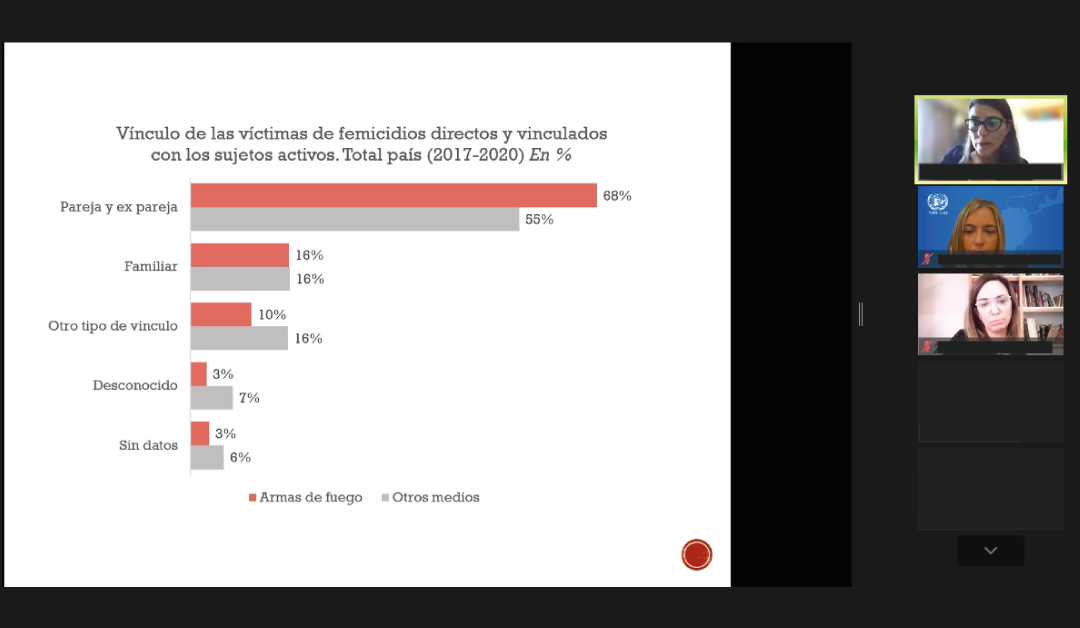On 6 December 2021, the United Nations Regional Centre for Peace, Disarmament and Development in Latin America and the Caribbean (UNLIREC) held a technical meeting that brought together officials from different governmental sectors and countries of the region, with the purpose of analysing the progress and challenges related to the inclusion of gender considerations recommended in the United Nations Programme of Action to Prevent, Combat and Eradicate the Illicit Trade in Small Arms and Light Weapons in All Its Aspects (hereinafter PoA).
Thirty-seven officials participated in the meeting from Ministries of Foreign Affairs; PoA Coordination Mechanisms; Firearms Control and Regulation Agencies; Criminal Statistics Offices; and Bodies with a mandate in gender and women’s equality.
UNLIREC provided an introduction on the implications of the PoA, highlighting when gender considerations were included, namely at the Sixth and Seventh Biennial Meeting of States (BMS6, 2016 and BMS7, 2021) and at the Third Review Conference (RevCon3, 2018). Among the various commitments, the following highlights those that were addressed:
- Consider the different effects of illicit small arms and light weapons (hereinafter SALW) on women, men, young girls and boys in policies and programmes aiming to combat illicit trafficking of these weapons, and encourage the collection of disaggregated data on gender and the illicit trade in SALW.
- Ensure coordination between national authorities responsible for executing the PoA and the relevant ministries or other national authorities with a mandate on gender equality, as well as women’s CSOs.
- Share national experiences, lessons learned and best practices on mainstreaming gender aspects in politics and programmes aimed at combatting illicit SALW trafficking, and to voluntarily provide information and communicate gender-relevant initiatives as part of the national PoA and ITI implementation reports; among others.
While States have made considerable progress in recognising the above-mentioned issues, an analysis of the National Reports reveals difficulties in the local implementation of these commitments. It is due to this that, to encourage debate and exchange national best practices, three countries with initiatives that contribute to the gender commitments of the PoA were called upon to participate.
These experiences included Guatemala’s National Commission for the Prevention of Armed Violence, which proposes an expanded approach to the Commission’s composition and allows for the inclusion of non-traditional sectors. On the other hand, regarding the collection of SALW data disaggregated by gender, the National Institute of Statistics and Geography (INEGI) of Mexico presented on the inclusion of the category “firearm” in the National Survey on the Dynamics of Household Relationships (ENDIREH). The National Registry of Femicides of Argentina also presented the findings of a recent study they are conducting in cooperation with the National Agency of Controlled Materials (ANMaC) regarding the highest possible disaggregation of firearms involved in femicides (authorised/unauthorised firearms; regulation firearms-FFSS). Likewise, ANMaC delivered a presentation onvarious initiatives with a gender perspective, among which the following stand out: gender training for security forces and shooting instructors; cooperation with the justice system to establish registration obstacles and disqualifications for persons accused of gender-based violence, among other initiatives.
We at UNLIREC hope that the meeting has contributed to the integration of gender considerations in the implementation of national policies and actions for firearms control, armed violence prevention and combating illicit trafficking of SALW.





This activity took place within the framework of UNLIREC’s Women, Disarmament, Non-Proliferation and Arms Control Programme, funded by the European Union and Canada, and was part of the International Campaign #16 Days of Activism Against Gender Violence (25 November – 10 December).

